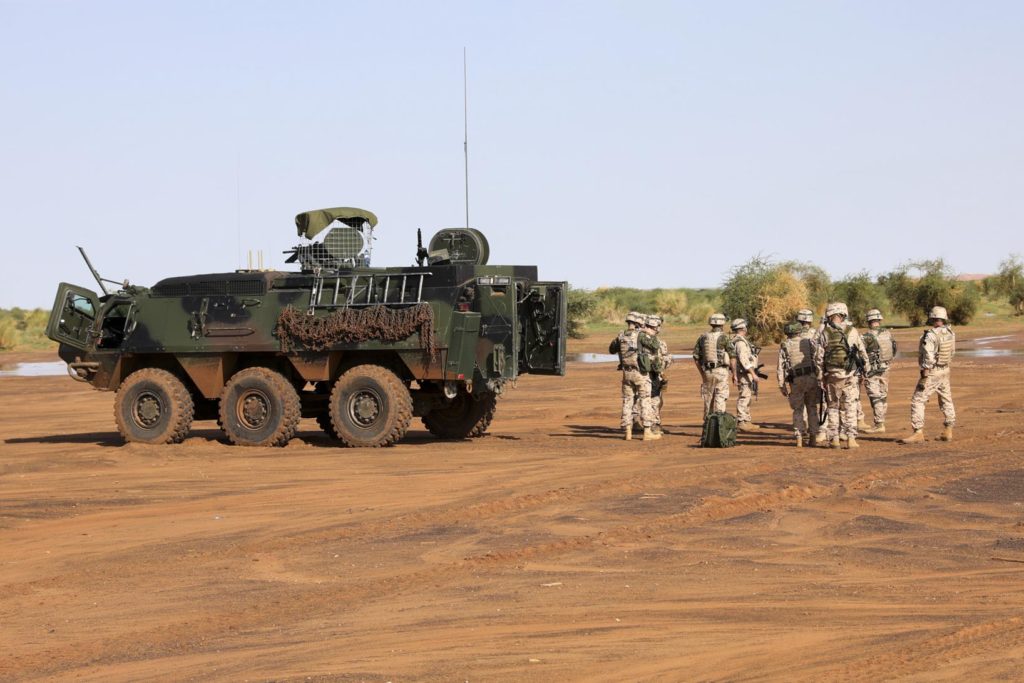Estonia’s parliament has approved a plan to almost double the country’s troop deployment to the France-led Operation Barkhane counter-terrorism mission in the Sahel, the defense ministry said in a release.
The Riigikogu on Wednesday, November 6 approved mandates which allow Estonia to send up to 160 troops to international military operations including in Afghanistan, Iraq and Lebanon, as well as to keep 234 service members at a state of readiness next year, the release said.
The Barkhane contingent will increase from 50 to 95 troops, and special operations forces will be deployed.
Estonia first sent troops to Mali in August 2018, and they are currently stationed in the central Mali town of Gao at the country’s major permanent French base. The large camp in Gao is shared between Barkhane forces, the United Nations peacekeeping mission MINUSMA, and the Malian Armed Forces (FAMa).
Estonian troops focus on force protection for the Barkhane base, manning checkpoints, providing escorts and conducting patrols. The need for vigilance was underscored in July, when troops thwarted a suicide car bomb and gun attack at the Gao camp. Six Estonian personnel were injured in the incident.


Many armed groups are active in Mali and the wider Sahel region, including Islamic State-affiliated groups. The majority of attacks are attributed to JNIM, which formed in March 2017 from a merger of several smaller groups including the Sahara branch of al-Qaeda in the Islamic Maghreb, Ansar Dine and al-Mourabitoun. JNIM’s leadership has pledged allegiance to al-Qaeda leader Ayman al-Zawahiri.
“The French-led operation is engaged directly in the fight against armed terrorism in Mali,” Defence Minister Juri Luik said, noting that Barkhane enables Estonia to “work with our closest allies, such as France.”
The defense ministry release noted that France is committed to contribute to NATO enhanced Forward Presence in Estonia in 2021.
“Mali is definitely dangerous, but it should not be forgotten that this is one of the reasons we are in the region and the end goal of the operation is to stabilize the situation in the region to a level which allows the national authorities of countries in the region to independently ensure security,” Luik said.
“The international community understands well that the potential terrorism and migration threat must be dealt seriously on-site,” he added.
Estonia will also continue to contribute staff officers to MINUSMA and the European Union Training Mission.
On November 5, Armed Forces Minister Florence Parly said that France expects a new international special operations task force to deploy in Mali by 2020 to help train local troops. Around a dozen countries have been approached to join the unit, named “Takuba,” which means “sabre” in the Tuareg language.
The French plans for a new Sahel task force were first reported in early October. The aim is to improve basic training for Sahelien military forces, beginning with Mali. This will free up Barkhane personnel, enabling them to focus on pursuing insurgents and preventing attacks.
It is unclear whether Estonian troops will join Task Force Takuba. The defense ministry has not yet responded to a request for comment.
International operations in the Sahel
In 2012 a Tuareg separatist uprising against the state was exploited by Islamist extremists linked to al-Qaeda who took key cities in Mali’s desert north.
France began its Operation Serval military intervention in its former colony early the next year, driving the jihadists from the towns, and the MINUSMA peacekeeping force was then established.
But the militant groups have morphed into more nimble formations operating in rural areas, and the insurgency has gradually spread to central and southern regions of Mali and across the borders into neighboring Burkina Faso and Niger. Large swathes of Mali remain outside government control, and inter-ethnic bloodshed is a regular occurrence.
The Serval mission evolved in August 2014 into Operation Barkhane, and roughly 4,500 French troops are deployed in the region, including around 2,700 soldiers in Mali. Force protection personnel from Estonia and Chinook helicopters from the United Kingdom currently support Barkhane, and Denmark is to send two helicopters and up to 70 troops in December.
Operation Barkhane focuses activity in insurgent-hit Mali, Niger and Burkina Faso, and troops work alongside other international operations, including the roughly 14,000-strong MINUSMA U.N. stabilization mission in Mali, and the G5 Sahel Joint Force (FCG5S), the long-planned 4,500-strong joint counter-terrorism force comprising troops from Burkina Faso, Chad, Mali, Niger and Mauritania.
The European Union also funds a Training Mission in Mali, which has a mandate until May 2020. Troops from 22 member states and five non-E.U. states work with both FAMa and the FCG5S. It has trained around 13,000 FAMa personnel.
U.S. officials said in August that the U.S. will seek additional contributions from the Global Coalition Against ISIS to combat the group and its affiliates in Africa. At the request of France, members of the U.S.-led Coalition will meet in Washington on November 14.


